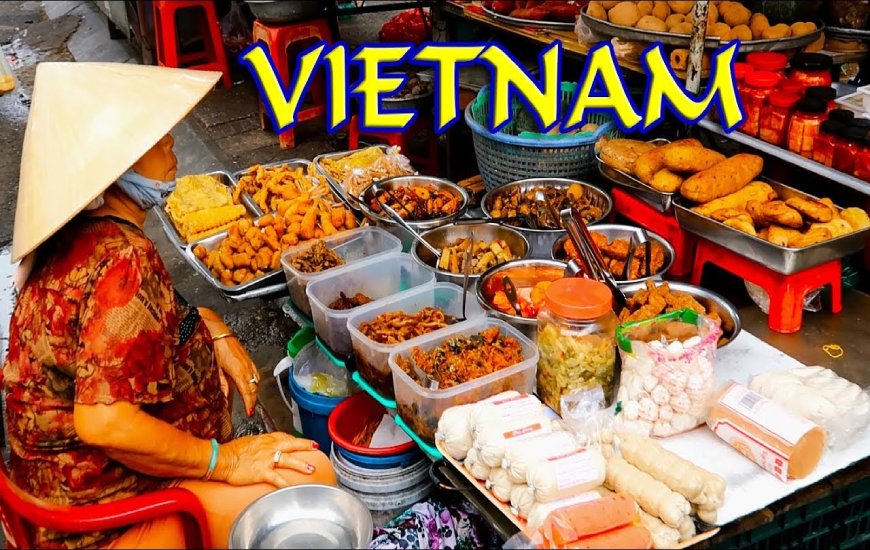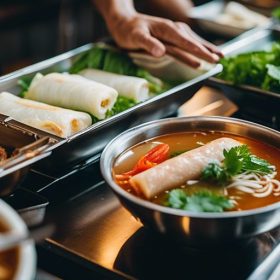Food insecurity refers to the lack of access to sufficient, safe, and nutritious food that meets the dietary needs and preferences of individuals. It is a complex issue that affects millions of people around the world, including Vietnam. Despite being one of the largest exporters of agricultural products in Southeast Asia, Vietnam still faces significant challenges in ensuring food security for its population.
In Vietnam, food insecurity is a pressing issue that affects both rural and urban areas. According to the Food and Agriculture Organization (FAO), around 10% of the population in Vietnam is considered undernourished, meaning they do not have enough food to meet their basic nutritional needs. Additionally, a large proportion of the population suffers from micronutrient deficiencies, such as iron and vitamin A deficiencies.
Understanding the Causes of Food Insecurity in Vietnam
There are several factors that contribute to food insecurity in Vietnam. One of the main causes is poverty and income inequality. Many people in Vietnam live in poverty and struggle to afford nutritious food. The high levels of income inequality exacerbate this issue, as the poorest segments of the population have limited access to resources and opportunities.
Limited access to resources and infrastructure is another major cause of food insecurity in Vietnam. Many rural areas lack basic infrastructure such as roads, irrigation systems, and storage facilities, making it difficult for farmers to produce and transport their crops. This leads to lower agricultural productivity and higher post-harvest losses.
Climate change and natural disasters also play a significant role in food insecurity in Vietnam. The country is highly vulnerable to the impacts of climate change, including increased frequency and intensity of extreme weather events such as droughts, floods, and typhoons. These events can destroy crops, livestock, and infrastructure, leading to food shortages and price volatility.
Political and economic instability further exacerbate food insecurity in Vietnam. Instability can disrupt agricultural production and trade, leading to food shortages and price spikes. Additionally, political and economic instability can hinder the implementation of effective policies and programs to address food insecurity.
The Impact of Food Insecurity on Vietnamese Society
Food insecurity has wide-ranging impacts on Vietnamese society, affecting not only individuals and families but also the economy and social fabric of the country.
One of the most significant impacts of food insecurity is on health. When people do not have access to sufficient and nutritious food, they are more likely to suffer from malnutrition and related health problems. This includes stunted growth in children, increased susceptibility to diseases, and impaired cognitive development. Malnutrition can have long-term consequences, affecting individuals’ productivity and overall well-being.
Food insecurity also has economic consequences. When people do not have enough food to eat, they are less able to work and be productive. This can lead to decreased economic output and lower incomes for individuals and families. Additionally, food price volatility can make it difficult for households to plan and budget their expenses, further exacerbating poverty and inequality.
Socially, food insecurity can lead to social unrest and instability. When people are unable to access sufficient food, they may resort to desperate measures such as theft or engaging in illegal activities to feed themselves and their families. This can strain social cohesion and lead to increased crime rates.
The Role of Government in Addressing Food Insecurity
The Vietnamese government plays a crucial role in addressing food insecurity through the implementation of policies and programs. The government has implemented various initiatives aimed at improving agricultural productivity, increasing access to resources, and reducing poverty.
One of the key policies implemented by the government is the National Target Program on Sustainable Poverty Reduction and New Rural Development. This program aims to improve rural infrastructure, enhance agricultural productivity, promote sustainable farming practices, and provide social protection for vulnerable populations.
The government has also implemented programs to improve access to credit for farmers, provide technical assistance and training, and promote the use of modern agricultural technologies. These initiatives aim to increase agricultural productivity and income for farmers, thereby reducing food insecurity.
However, there are challenges and limitations to addressing food insecurity in Vietnam. Limited funding and resources, bureaucratic inefficiencies, and a lack of coordination between different government agencies can hinder the effective implementation of policies and programs. Additionally, the impacts of climate change and natural disasters pose significant challenges that require innovative and adaptive approaches.
The Importance of International Aid in Combating Food Insecurity
International aid plays a crucial role in supporting Vietnam’s efforts to combat food insecurity. Many international organizations, such as the World Food Programme (WFP) and the United Nations Development Programme (UNDP), provide financial and technical assistance to Vietnam to implement programs aimed at improving food security.
International aid helps to fill the funding gap and provides resources for implementing projects that address the root causes of food insecurity. This includes initiatives focused on improving agricultural productivity, enhancing access to resources, promoting sustainable farming practices, and strengthening social protection systems.
There have been several successful aid programs in Vietnam that have made a significant impact on reducing food insecurity. For example, the WFP has implemented school feeding programs that provide nutritious meals to children in rural areas. These programs not only improve children’s nutrition but also incentivize school attendance, leading to improved educational outcomes.
The Need for Sustainable Agriculture and Food Production
Sustainable agriculture is crucial for addressing food insecurity in Vietnam. Sustainable agriculture practices aim to maximize productivity while minimizing negative environmental impacts. This includes practices such as organic farming, agroforestry, crop rotation, and integrated pest management.
Sustainable agriculture helps to protect natural resources such as soil, water, and biodiversity, ensuring their long-term availability for future generations. It also helps to build resilience against climate change by promoting adaptive farming practices that can withstand extreme weather events.
In Vietnam, there are several examples of sustainable agriculture practices being implemented. For instance, the government has promoted the use of organic farming techniques and provided training and support to farmers to transition to organic production. This not only improves the quality of agricultural products but also reduces the use of chemical inputs, benefiting both farmers and consumers.
The Role of Education in Raising Awareness about Food Insecurity
Education plays a crucial role in addressing food insecurity by raising awareness and promoting behavior change. By educating individuals and communities about the importance of nutritious food, sustainable farming practices, and food waste reduction, they can make informed choices that contribute to food security.
In Vietnam, there are several educational programs aimed at raising awareness about food insecurity and promoting sustainable agriculture. For example, the Ministry of Education and Training has integrated food security and sustainable agriculture into the national curriculum, ensuring that students receive education on these topics from an early age.
Non-governmental organizations (NGOs) also play a vital role in educating communities about food insecurity. They organize workshops, training sessions, and awareness campaigns to empower individuals with knowledge and skills to address food insecurity at the grassroots level.
The Impact of Climate Change on Food Insecurity in Vietnam
Vietnam is highly vulnerable to the impacts of climate change, which pose significant challenges to food security. Rising temperatures, changing rainfall patterns, increased frequency and intensity of extreme weather events, and sea-level rise all have profound effects on agricultural production and food security.
Climate change affects food production by altering growing seasons, reducing crop yields, increasing pest and disease outbreaks, and degrading soil fertility. Extreme weather events such as droughts, floods, and typhoons can destroy crops, livestock, and infrastructure, leading to food shortages and price volatility.
The impacts of climate change are particularly severe in coastal areas of Vietnam, where rising sea levels threaten agricultural land and freshwater resources. This puts coastal communities at risk of displacement and exacerbates existing vulnerabilities related to poverty and food insecurity.
The Need for Innovative Solutions to Address Food Insecurity
Addressing food insecurity in Vietnam requires innovative and adaptive solutions that take into account the complex and interconnected nature of the issue. Traditional approaches may not be sufficient to tackle the multifaceted challenges posed by poverty, limited resources, climate change, and political and economic instability.
In Vietnam, there are several examples of innovative solutions being implemented to address food insecurity. For instance, the use of mobile technology and digital platforms has been leveraged to improve access to information, markets, and financial services for farmers. This helps to increase their productivity, income, and resilience to shocks.
Another example is the promotion of urban agriculture and rooftop gardens in cities. This allows urban dwellers to grow their own food, reducing their dependence on external food sources and increasing their access to fresh and nutritious produce.
The Importance of Collaboration and Partnership in Combating Food Insecurity
Addressing food insecurity requires collaboration and partnership between government agencies, NGOs, the private sector, and local communities. No single actor can tackle this complex issue alone. By working together, different stakeholders can leverage their respective strengths and resources to achieve greater impact.
Government agencies play a crucial role in setting policies and creating an enabling environment for addressing food insecurity. NGOs bring expertise, grassroots connections, and innovative approaches to the table. The private sector can contribute through investments in sustainable agriculture, value chain development, and market linkages.
In Vietnam, there have been successful partnerships between government agencies, NGOs, and the private sector that have made a significant impact on reducing food insecurity. For example, the Partnership for Sustainable Agriculture in Vietnam (PSAV) brings together government agencies, NGOs, and agribusinesses to promote sustainable farming practices and improve market access for smallholder farmers.
The Urgent Need to Address Food Insecurity in Vietnam
Food insecurity is a pressing issue in Vietnam that affects millions of people and has wide-ranging impacts on health, the economy, and social stability. Addressing food insecurity requires a multi-faceted approach that tackles the root causes of the issue, such as poverty, limited resources, climate change, and political and economic instability.
The Vietnamese government plays a crucial role in addressing food insecurity through the implementation of policies and programs. However, there are challenges and limitations that need to be overcome, such as limited funding and resources, bureaucratic inefficiencies, and the impacts of climate change.
International aid is also important in supporting Vietnam’s efforts to combat food insecurity. Aid programs can provide financial and technical assistance to implement projects that address the root causes of food insecurity.
Sustainable agriculture and food production are essential for ensuring long-term food security in Vietnam. By promoting sustainable farming practices, protecting natural resources, and building resilience against climate change, Vietnam can improve agricultural productivity and reduce vulnerability to food insecurity.
Education plays a vital role in raising awareness about food insecurity and promoting behavior change. By educating individuals and communities about the importance of nutritious food, sustainable farming practices, and food waste reduction, they can make informed choices that contribute to food security.
Addressing food insecurity requires innovative solutions that take into account the complex and interconnected nature of the issue. Traditional approaches may not be sufficient to tackle the multifaceted challenges posed by poverty, limited resources, climate change, and political and economic instability.
Collaboration and partnership between government agencies, NGOs, the private sector, and local communities are crucial for addressing food insecurity. By working together, different stakeholders can leverage their respective strengths and resources to achieve greater impact.
In conclusion, addressing food insecurity in Vietnam is an urgent priority that requires a comprehensive and collaborative approach. By addressing the root causes of food insecurity, promoting sustainable agriculture practices, raising awareness through education, and leveraging international aid and partnerships, Vietnam can make significant progress towards achieving food security for all its citizens.

Cuong Nguyen is a talented writer and experienced waitress at Vietnampalace.net, a renowned Vietnamese restaurant that offers an extensive menu of authentic Vietnamese cuisine. With a background in the competition of Vietnamese cuisine, Cuong brings a wealth of knowledge and expertise to the dining experience. From delicious pho dishes to fresh spring rolls, Cuong ensures that every meal is made with the freshest ingredients and authentic flavors.With exceptional service and a friendly atmosphere, Cuong takes pride in providing a memorable dining experience for every customer.
Whether you’re a vegetarian looking for options or a meat lover craving the flavors of traditional Vietnamese dishes, Cuong guarantees a delightful culinary adventure. So, visit Vietnampalace.net and let Cuong guide you through the tantalizing world of Vietnamese cuisine.



